#danaë speaks
Explore tagged Tumblr posts
Text
"omg im so thirsty"
*drinks anything but water bc the taste of water is gross and overstimulating*
#danaë speaks#what can i do if the taste it's horrendous?#i would rather kms over drinking 2l of it everyday. gross#autism#actually autistic#neurodivergent#actually autism#actually audhd#adhd#audhd#adhd problems#autism problems#autistic#autism spectrum#autism things#adhd things#neurodiversity#its the neurodivergency#actually neurodivergent#neurodiverse stuff#actually neurodiverse#neurodivergency
152 notes
·
View notes
Text
cutesy little announcement
just to make everyone aware, my posting schedule is as follows:
wednesday: wip wednesday
thursday: everything to win
friday: hercules au
i try to stick to a schedule so i write more consistently and don't abandon my fics 😭
also if you're here from twitter, let me know!!!
chapter 3 tomorrow! see y'all then!
#poe dameron x oc#poe dameron x f!oc#everything to win fic#meljay#if there's a prize for rotten judgement fic#mel medarda x jayce talis#danaë speaks
3 notes
·
View notes
Text
Thinking about how Perseus thought that Polydectes was his friend in this source:

This is so interesting to me bc ppl tend to portray Perseus as “over protective” (Demeter knows the feeling lol) but here he seems to be on somewhat friendly terms with Polydectes (which makes sense bc he’s Dictys’s brother), but it goes to show that Perseus wasn’t the one to reject Polydectes out of over protectiveness or hatred, but bc Danaë rejected Polydectes and he knew that Perseus would defend her choice.



Daniel Ogden touched on this in his book Perseus. It would actually make perfect sense that Polydectes was friendly with Perseus (and likely also Dictys) to the point Perseus didn’t find it suspicious when he was invited to the feast. It makes sense that he’d manipulate Perseus’s very human and somewhat childish desire to be included with other men, to be viewed as a man instead of a boy and used it against him. Ppl usually have Perseus hating and distrusting Polydectes from the get go but I like this more bc it’s a more upsetting betrayal of trust. Especially considering he’s technically his foster uncle.
In a silent film called “The Gorgon’s Head” takes this approach with Polydectes, where he manipulates Perseus into seeing him as a father figure in order to get him killed. Which I feel is my favorite adaptation of their relationship.
#saw someone say that Perseus killed Medusa bc he was “dared by another rapist’’ to do it#I think this speaks for itself#Perseus by Daniel Ogden should be required reading for anyone who speaks on Perseus and Medusa I’m so serious#greek mythology#ancient greek mythology#greek pantheon#perseus#Danae#Danaë#Medusa#Polydectes#Perseus and Medusa
18 notes
·
View notes
Text
the ballad of andromeda, excerpt 7: you will save three women before the sun has set
hi. hello. so this is very overdue, but I really think its one of my best excerpts. its got action, its got profanity, its got badassery, its got murder!
this excerpt ties together the main cast of the myth. enter our party members: perseus, andromeda, medusa, and danaë.
i hope you enjoy <3 daph
--------------------------------------------------------------
You will save three women before the sun has set on this day, or doom them all.
Perseus had not meant to accept another quest. When he held the three fates' eye hostage in exchange for help on his quest, as grey-eyed Athena had instructed him, he envisioned receiving an enchanted sword that always found its mark or a magical apple that would increase his strength. He did not anticipate a prophecy.
Three women, he thinks. He already has a time limit on saving his mother. How is he supposed to save two other women before the day is done?
He should have told the fates where to shove their prophecy. He should have tossed their eye as far as he could, and while they were distracted, grabbed the invisibility helmet, sword, shield, pouch, and winged sandals and flew away. It is his mother's fault he has such impeccable manners not to go forth with that plan. It is also his mother's fault that even if he had wanted to ignore the prophecy, he could not, as he would never abandon anyone in need when he might be able to help.
One must be my mother, he reasons, tightening the straps of the shield on his forearm as he flies across the mountain range.
I only have to help two other women on my way back to mother, he concludes. Nothing will change.
Far above the mortal man flying with wings on his sandals and invisible for a time from the eyes of man, the stars watch on. They see the thread that has been woven for this young man and where it will lead him in the next hours. They hear his thoughts.
Nothing will change.
The stars gave a great, hearty, joyous laugh.
And watch on.
--------------------------
You are different, Medusa whispers, standing above him. He remains on the ground kneeling, eyes closed, head bent over his empty fists resting on the dirt in front of him. His shield remains strapped to his left forearm, and his sword lays beside his right hand on the ground, where he set it. The gorgon had not spoken for several minutes after he had given up. She merely stood over him in silent contemplation, the only noise in the cave being the hissing of her snake hair.
Why did you come? She asks.
Eyes closed, head bowed, he gives her the truth. He recounts his mother's imprisonment, sentenced by her father, and his non-consensual conception from the king of the gods. He describes the box he and his mother were trapped in for weeks on the sea. He speaks of the fisherman Dictys, of his kindness and love towards him and his mother. About king Polydectes’ obsession with his mother, how he had agreed to give the king anything to spare his mother, and how the king had sent him on an impossible quest to retrieve the unattainable - Medusa's head.
Ahh, the gorgon signs as he finishes his tale. You have come for my head.
No, he insists for the second time since entering her cave, I will not take your head.
Then, instead, will you take me? The gorgon asks quietly. He lifts his head and looks at the gorgon in surprise. And that would have been the end of his life had the gorgon not also been kneeling on the ground, head bowed, eyes closed, before him.
My lady? He asks, closing his eyes again; I do not understand.
Will you take me with you? To your home and to your mother? You are kind - kinder than any man I have ever encountered, and I can only imagine the type of woman your mother is. I am lonely in this cave, scared. They will continue to come until I am dead. But if I flee and return home with you, I will kill the king for you, and I will find a new home, and no one will ever find me.
Yes, he answers without thought. As if there is any other answer he could give to someone asking for help. Ah, he realizes as he stands and turns, replacing his sword into its sheath and tightening the sack tied to his belt that carries the helmet of invisibility; Medusa is one of the women I will save.
Ridiculous, he thinks as he motions for the gorgon to climb onto his back. She wraps her legs around his torso and her arms around his neck. He can feel her snakes slithering on his shoulders and the base of his neck. She is the one who is saving me.
High above, the stars watch these two fates weave together. The beginning of a beautiful future.
They watch on.
--------------------------
Perseus hears her before he sees her.
He almost mistook the screams for the waves crashing angry and restless upon the jagged edges of the cliff until he felt someone shake his shoulder.
Listen, Medusa hisses, leaning forward from where she held onto his back; a woman is screaming.
He listens. Faintly, under the crash of the water and the birds that dive for the waves, he could make out the sound of a woman's voice. He flew along the cliff face, searching for the source of the screams.
YOU BASTARDS! He hears shouted from further ahead of him and the gorgon. He continues to fly towards her voice as she continues, DO NOT LOOK AWAY! SEE ME! YOU DID THIS TO ME! AND NOW YOU WILL WATCH WHAT BECOMES OF ME!
Where are you? He pants, desperately searching the cliff face.
THERE! A clawed talon shoots past his face as the gorgon points downwards. Jutting out from the cliff face, barely wide enough to stand on, is a portion of rock that currently holds a woman. Something flashes and catches his eye. Gold chains run from the rock ledge the woman stands on up to her wrists, which are encased in cuffs.
And they say I am a monster, the gorgon scoffs, staring at the chained woman.
He could not look away. She is soaking wet. Her hair sticks in long, heavy curls across her face, arms and back. Her white dress is plastered to her body, translucent, darkening to grey as the dark skin underneath begins to bleed through. Her dress is torn at the bottom, up the centre of the shirt to her knees, both wet halves slap against her calves and the rocks, pushed back and forth by the wind.
But that is not what stops him, hovering midair. She whips her head to the side, flinging her wet hair from her face. He catches himself from closing his eyes on reflex, for her face holds the same fury as the gorgon on his back when she first appeared in his shield. Anger fills her eyes as she watches the sea, spitting out a mouthful of bloody seawater, baring her teeth. The clink of metal echoes as she pulls the chain taut, leaning forward over the ledge to shout into the oncoming waves.
CURSE YOU! She screams, with all the rage of the fiery pits of Tartarus, CURSE YOU ALL! I AM INNOCENT! IT WAS YOUR FAULT MOTHER, YOUR HUBRIS! YET I AM THE ONE TO PAY FOR IT! I MAY MEET MY END AT THE BOTTOM OF THE OCEAN, BUT YOU HAVE CHAINED ME HERE; YOU HAVE KILLED ME! YOU ARE MURDERERS!
The waves are crashing faster and higher on the rocks, being pushed by something fast approaching.
CURSE YOU POSEIDON! She continues, CURSE YOU FOR ASKING FOR AN INNOCENT TO PUNISH INSTEAD OF THE ONE WHO SLIGHTED YOU! YOU COWARD! YOU WHIMPERING, SNIVELLING, WEAK COWARD! YOU WANT TO TAKE ME? COME AND GET ME!
Holy gods, he whispered, staring in horror and awe at this woman, cursing the very god whose domain she stands chained above.
What are you waiting for? the gorgon asks, cackling with delight, enjoying the woman's blasphemous shouts; go and get her so we can return home!
He dives down towards the chained woman, the gorgon's arms and legs tightening around his neck and torso as they plunge towards the waves, straining against the strong winds.
MY LADY! he shouts, halting the wings on his sandals, grabbing the cliff's wall with one hand, hovering slightly above the woman and the waves crashing against the cliff's walls.
Hello, dear, we have come to rescue you! The gorgon adds, head tilted down and face pressed into his shoulder, hiding her eyes, as he unsheathes his sword.
WELL, HURRY AND USE THAT SWORD TO FREE ME, FOR FUC… she screams, the crashing waves cutting off her profanities. The gorgon laughs as he floats closer to the woman. She places her hands against the stone wall behind her, raising them as high as the chains will let her, pulling them taut. He moves close to her hand, gripping his sword, as he swings back and around his side before slicing it through the air, perpendicular to the top of the woman's head, and striking the chain just below the cuff. A reverberation zaps up his arm as the sword clangs against the stone.
THAT WAS MUCH TOO CLOSE TO MY HAND, YOU ASSHOLE! She screams, shaking her fist at him, the two chain links hanging off of the cuff clinking together.
Did you just call me an asshole? He demands, focusing on the next chain. I am rescuing you, and you call me names? What kind of gratitude is this?
She opens her mouth, most likely to tell him where he can shove his gratitude like any proper lady ought to when a monstrous shriek pierces his ears. He turns around, eyes on the open sea, staring as the screaming beast splashes back into the water. A moment later, it reemerges, shrieking, jumping out of the water before flopping back into the sea on its side like a whale.
IT IS CETUS! The woman yells from behind him, pulling on the chain that still holds her to the cliff. He looks back at the approaching monster, cataloguing its size. The creature's body is as wide as a temple column is tall, and if it were to stand upright on its tail, he believed the beast could reach the top of the cliff. When it opens its mouth to screech, he sees four rows of sharp teeth, as long as his sword and wickedly sharp. From the crown of its head to the base of its tail, there is a trail of large pointed scales sticking straight out of the monster's body, as thick as slabs of marble and as dark as its pitch-black eyes, which are fixed on the woman.
CUT THE CHAIN, she screams at him, CUT IT! CUT IT NOW!
Before he can lift his sword, he feels a tight squeeze on his shoulders.
You stop the sea creature; I will free the girl, the gorgon hisses, releasing her grip from around his neck. CLOSE YOUR EYES, DEAR, the gorgon instructs the woman before her legs release from his torso, and she falls. He raises his shield to gaze into, watching the gorgon land, grasping the rocks tightly as one leg falls over the platform's ledge. The gorgon crawls along the stone in front of the woman, and begins to tug on the chain, where it is attached to the cliff.
He leans forward, propelling his winged sandals to take him closer to the sea monster. He will buy the women time.
As the monster jumps from below the surface once again, he thrusts his sword, plunging it deep into the underbelly of the beast. It gives a horrible cry as the sword meets its flesh, which only increases in volume as he grips the sword tight and uses his winged sandals to push off the beast's stomach and propel backwards, ripping the sword from the monster's flesh.
However, the monster does not sink below the surface as it had before; it remains out of the water, its tail whipping through the water violently, coiling underneath the beast's enormous body like a snake. The monster swivels its head towards him, now stable on its tail, and lunges at him, mouth wide.
He dodges the monster's sharp teeth but makes an impact with the monster's head, losing his balance in the air. He splays across the beast's sleek, slippery skin, rolling head over feet as he begins to slide down the side of the beast back towards the sea. On reflex, he plunges his sword into the slimy flesh to cease his fall. But he failed to recall the earlier reaction the beast had to being stabbed. Before he can ready his feet to fly again, he is being whipped from the beast's body and flung through the air until the stone wall of the cliff stops him.
Coming out of his daze, he has just enough time to fly upwards as the monster crashes face first, teeth bared, into the stone where he was moments ago. But the creature is not deterred. It continues to chase him upwards, snapping its teeth and catching a mouthful of the Fate's untearable sack that is currently tied to his belt. He is yanked down, landing on all fours on the clenched teeth of the sea creature.
This would have been his last moments alive for the second time today, if not for the women he has encountered on his quest. Just as Cetus was about to open his massive mouth, swallowing him whole, he catches a flash of light in his peripherals. Then, there is a golden chain, dripping seawater, being whipped directly into the sea creature's eye.
The creature flinches, flinging him into a freefall as it releases a roar of pain. Out of imminent danger and the creature's focus, he catches himself, righting his sandaled feet under him, and steadies himself against the cliff face, watching as the golden chain is reeled back in by the furious woman on her ledge.
Then, the monster stops.
So quickly, if he had blinked he would have missed Cetus transforming into stone, mouth opened wide in a forever roar. But the sea creature is still moving, and he begins too as well. As gravity begins to pull the off-balanced stone giant towards the sea, he races towards the two women still standing on the jutted ledge of the cliff. Barely landing, he gets an arm around each woman's waist before he is shooting up, and up, and up. They crest the top of the cliff just as the wave does, shooting into the sky from the massive impact from the stone sea creature.
As he soars towards the directio of his home, with two of three women he is destined to save, he turns to glance at the newest member of his party. Soaking wet, with the gold cuffs still around her wrists, the woman is staring at something to the side of where they are heading. When he glances over, he spots two people, standing and watching their departcher, clad in brightly coloured clothing and extravagant jewlery. The look is complete with a circlet of gold upon each of their heads. Royalty, he surmisses.
As they continue flying away from the cliftside and the royal couple, the womans words are almost lost in the crash of the waves and the roar of the wind. But he is holding her, and he packs up her whispered farwell.
Goodbye, mother, father, she breathes into the rushing wind, may you live forever.
High above, the stars continue to watch the fates of these souls weave together. They smile at the intricate story taking shape in the tapestry these threads are weaving.
They watch on.
--------------------------
I will be deaf before we reach Seriphos, he thinks as he swoops around another mountain peak.
The woman screams at every drop, every approaching mountain, and every flock of birds passing by. The gorgon does not help the girls' fear, pointing out different obstacles that the three might crash into or how much pain they will feel if they fall from certain heights.
His arms have been numb for two hours before he sees the familiar shore of the place that he currently calls home. He flies along the outskirts of the polis, not wanting to draw attention to his companions and himself.
Medi, he whispers, taking care not to rouse the sleeping woman he carries in his arm.
Percy? The gorgon answers, voice quiet.
These are the mountains I told you of; he nods his head to the left, where several mountains form a range that circles the west side of the polis.
The mountains are too steep to climb and are too high to have much vegetation, so there is little point for the villagers to venture up, he explains.
We will scout a cave for you, perhaps near a stream, and fix you up safe and sound. No one will bother you here.
Thank you, Perseus, the gorgon whispered after a moment, for all you have done for me.
I did nothing, Medusa, he insisted, nothing other than what should be done.
Well, I thank you, nonetheless.
Several minutes passed in silence before the gorgon spoke again. And what of our rescued princess? Where will she stay?
With my mother and I, he responds immediately. Then waits for a beat. If she so desires, he amends.
My sweet boy, the gorgon snickers; she will eat you alive.
I can hardly wait, he tells the gorgon, looking down at the sleeping princess he held in his arms.
She is a good one, the gorgon continues. Anyone who is willing to tell the god of the sea to go fuck himself while standing on a cliff over said sea is worthy, in my mind.
Mine too, he admitted, though it did make my heart stop.
The gorgon chuckles; Of course it did. You care too much.
I care the right amount, he corrects, that every person should care.
If only every person were like you, the gorgon sighs, sounding far away.
At that moment, the sun passed completely behind the mountain range to their left, casting the polis in shadow.
Quickly now, my dear, we still have one woman left to save and only a small amount of time before the day is done, the gorgon reminds him, gripping his shoulders tight.
Indeed, he grins. I believe we owe the king a visit.
He could not see her face as he flew straight towards the castle grounds, but he would bet all the drachmas in his possession that the gorgon wore a delightful, wicked, eager smile.
--------------------------
Do not fear, my lady. I will protect you no matter what occurs, Perseus promises the woman he stands beside.
A soft snort comes from behind his back, likely from the gorgon he carries over his shoulder. That is not reassuring, Percy, the gorgon continues to laugh, voice muffled by the sack she wears over her head. You’ve scared the poor girl even more now. Not to fear; I will protect you, my dear.
Medi, he hisses, giving the gorgon a shake from where he holds her legs; you are supposed to be dead. Dead people cannot speak!
What a bore being dead is, the gorgon sighs, finally going limp against his shoulder and back, playing her part.
I feel very safe, the woman to his right chimes in. Thank you, Medi, for your protection. He catches her sly smirk out of the corner of his eye just as he feels a sharp talon jab at his back.
Honestly, you two, he grumbles under his breath as they reach the front gates of the palace, raising his free arm that holds his shield at the awaiting guards.
State your name and purpose, the guards demand.
It is I, Perseus, son of Danaë. I have returned from my quest, granted by our most gracious king. Open the gates so that I may bring him the monster I have slain! He boasts, flexing his muscles ever so slightly. He can almost feel Medusa rolling her eyes and is glad for the sack covering her face.
The guards stare at him in wonder, looking at the woman draped over his shoulder in fear, and quickly open the gates.
He does not wait, marching towards the castle with the woman at his side, stopping at the door.
Together, the woman at his side whispers, let us make a spectacle. Her eyes glisten with mischief as she places her hands on one half of the double doors while he places his unoccupied hand on the other and together they push open the doors at the same time. He uses so much strength that the door bangs against the wall, echoing a loud bang through the occupied throne room. He is surprised and delighted to see that the woman pushed her door so hard it too made a bang against the wall, causing the people present to grow quiet and turn their way.
Perseus strides into the throne room, straight towards the king, who is sitting atop his throne.
Come, men! Come and see! Our plight is no more! For I, Perseus, have slain Medusa and bring her body to our great king! He exclaims, reaching the bottom of the throne. As the king's men cheer, gathering to see the cursed woman, he sees his mother sitting beside the throne, watching him. He meets her eyes and closes his eyes tight, keeping them closed for a moment too long. Opening them again, his mother nods, closing her eyes tight and lowering her head to the floor, the picture of a perfect, demure, soon-to-be-wife of the king.
He stops in front of the king, bowing deep, careful of his hold on the gorgon.
My king, straightening, he stares into Polydectes’ eyes, his grin growing as the king's face turns red with fury.
I have completed the impossible quest you sent me on, he begins, removing the gorgon from his shoulder and laying her on the floor before him.
I return to claim my winnings. My mother, in exchange for the gorgon's head, he finishes, tearing the sack from Medusa's head. The men gasp as the gorgon's face is revealed, lax in presumed death, eyes closed, and telltale snake hair limp against the stone floor.
I asked for her head, the king states, silencing the whispers of his men immediately. But you have brought me all of her.
Yes, my king, he answers, I have killed her, but I thought you might like the honours of beheading the beast. He steps back, gesturing to the woman lying on the floor.
The king begins to grin as he rises from his seat and unsheaths his sword. His men cheer as he makes his way down from the throne.
I will enjoy this, the king leers, hoisting his sword high over his head, ready to bring it down on the gorgon's neck.
As will I, Perseus admits, closing his eyes tight and lowering his head, pulling the woman close to his body and pressing her face into his side, his shield arm wrapping around her back.
The screams end just as they begin. The sound of rapid retreating footfalls and swords being drawn from sheaths is replaced with a crackling noise as if sand is being rubbed against a rock. Until the only sound is the hissing of several snakes.
A moment, my dears, Medusa asks, breaking the silence; keep your eyes closed.
He hears shuffling, fabric being dragged over stone until he feels a warm hand cover his where it is resting on the hilt of his sword.
May I borrow your sword for a moment, dear? The gorgon asks.
Of course, he tells her, releasing the hilt. He feels the sword being drawn from its sheath then hears a ripping noise, as if fabric is being torn apart. His sword is placed back into his hand, and another moment of rustling passes before the gorgon tells them they may open their eyes.
Slowly, he opens his eyes and raises his head to find the throne room covered in stone statues of the king and his men in various states of destress. Their horror forever etched onto their faces. And in the midst of the stone terror, Medusa sits, with the remains of the fates’ sack torn up into a long, opaque strip, tied around her eyes, as outside the castle, the sun finally sets.
--------------------------
As the moon glows brightly in the sky overhead, Perseus stands in a room with three women. A mother, a friend, and a lover (though he is unaware of this fact as of now). He does not give much thought to the role each woman will play in his life moving forward, for at this moment, all he can think about is going to sleep. He leads the women towards his family's home and kisses his mother on the cheek, watching her lead a blindfolded Medusa to the guest room. He turns to the woman he rescued from the cliff to tell her goodnight, but she is already walking away from him. He tries to call after her, but he realizes at that moment that she had not told him her name.
Unbeknownst to Perseus, fast asleep in his bed, or Danaë, turning down her bed linens, or Medusa, face down and passed out in the guest room, or even Andromeda, staring out the window of her room, looking at the moon, that the stars overhead are rejoicing. The time has come for four strings to weave together as one. The stars watch in awe as the strings begin to form a tapestry, and the mortals down below begin the rest of their lives.
4 notes
·
View notes
Text
Amidst her sanguinary tears, still her scolding pen's ink remains unspent.

Chapter i: Ruby.
My name is Ruby. My name happens to be the same as Rudbeckia from 남편을 내 편으로 만드는 방법. My pronouns are she/her and I do writing, drawing, and editing activities. My personality type is ENFJ 7w6, so my behaviour and personality may be perceived as loud and talkative. For my age, I am 19 years old, so I'm a major/legal. But if you ever have to interact with me in the future, I do hope that we can keep our conversation casual and free of formalities! :)


Chapter ii: Aporia.
I have interested in many subjects. I delight in the exquisite works of talented sculptors and am smitten by the intricate details of their masterpieces. Their creations elicit a visceral response from me, drawing me into the emotions and facial expressions depicted in their works. My love of music knows no bounds as it has the ability to soothe my soul in my darkest moments and lift my spirits in my happiest. Whether instrumental or lyrical, the nuances of a song's tone and rhythm speak volumes to me. Flowers have been my interests from a young age and I find tremendous satisfaction in researching their names, histories, and uses. The study of architecture captivates me as well, as I delight in observing the intricate designs of buildings and the textures of their facades. I am endlessly fascinated by this spectrum of interests and feel they have shaped me into the individual I am today. ଘ(੭ˊᵕˋ)੭

Chapter iii: Musophile
Here is the artists that I hold close to my heart (and my favorite work from them) ᯓᡣ𐭩
Taylor Swift ❥ .. (Guilty as Sin? & Fearless)
Gustav Klimt ❥ .. (Danaë, 1907)
Michelangelo ❥ .. (Sagrestia Nuova, 1520)
TV Girl ❥ .. (Lovers Rock)
Mitski ❥ .. (Crack Baby)
Boy Pablo ❥ .. (Dance, Baby!)
B.V. Doshi ❥ .. (Sangath Architect's Studio, 1981)
Tomorrow x Together ❥ .. (Happy Fools & Deja Vu)
SEVENTEEN ❥ .. (I Don't Understand But I Luv U)
TWICE ❥ .. (SIGNAL & Heart Shaker)
TAEYANG - BIGBANG ❥ .. (RINGA LINGA)
Robin - Chevy ❥ .. (Hope Is the Thing With Feathers)
Verily, this concludes my introduction. However, if you happen to come across this epistle and find yourself curious, please don't hesitate to send me a questions in my profile or befriend me on Instagram at rubylvei. I welcome any inquiries and am eager to make new acquaintances! >ᴗ0
2 notes
·
View notes
Note
By the time my tulips flower, I think I'll have come off anon or you'll have guessed who I am!
That is definitely cheating because I could have predicted that! 😂 But I get it, queer movies in general are lacking, and it is very adorable 🥰
I do like art, I've not seen as much in real life as I'd like to. I'm not sure I could pick a favourite artist because I always like a variety of different things. My two favourite paintings are Wheat Fields with Cypresses - Van Gogh and Danaë - Klimt.
1. If you could go back in time and visit a different time period for a few days, which period would you pick?
2. Favourite gift you've been given in the last year?
3. Do you have a creative hobby? If yes, what? If no, what would you like to be able to do?
Ohhhh! Well, I’m horrible at guessing so I’m not sure about that option hahah
I’m sorry it was cheating 🫣 it’s just, I need that sequel so so baaaaad 😭😭
I understand the struggle and I love the paintings you’ve chosen!!
I used to design and edit things in photoshop but I stopped doing that years ago, and I’d love to get back to it someday, maybe next year!
1. Do you speak another language? If yes, which one? If not, what language would you like to learn?
2. If you could spend the day with a famous person, who would you choose?
3. Did you go to a One Direction show? If yes, when?
#it’s getting harder to think more questions because my brain is blank hahaha#crush anon#mensaje resp
1 note
·
View note
Text
Bro What The Actual Fuck Ep 1
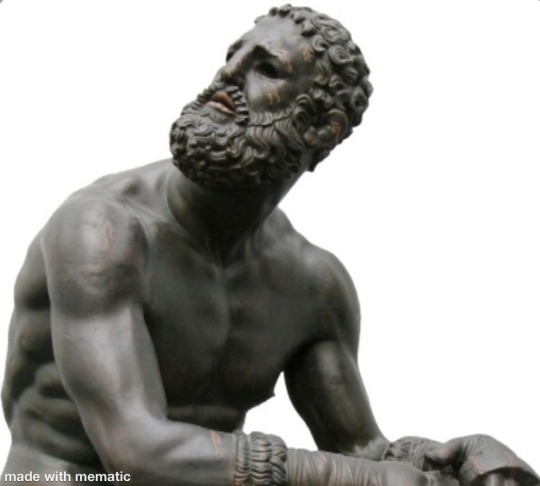
Ok I'm gonna start another mini series about how fucked up myths are! I'm calling it
Bro what the actual fuck
As a warning, this series will contain some triggering material, as mythology is, unfortunately, really fucked up. I'll try my best to preface any specific triggering portions beforehand, by saying (TW: [trigger]), and then following it by the triggering content in these brackets: {}, but I just want to make this clear from the start
So I'll start the series off with the one everyone knows: Greco-Roman mythology. Always nice to do a classic, right?
So where do I begin?
How about Zagreus, who was the (TW: SA, !nc3st) {r@p3 child of Persephone and Zeus}, though in some versions its Hades and Persephone.
Yes, Zeus made the beast with two backs with (TW: !nc3st) {his dear daughter, Persephone}, and had a young child, Zagreus. Unfortunately Zagreus was later killed, sliced up by daddy Kronos, if memory serves correctly, though it may have been other Titans instead. Gods can’t die, though, so his spirit remains, and eventually he’s reborn as Dionysus, the son of Semele and Zeus. Fun fact, this is why, in earlier myths, Dionysus isn't considered a demigod from birth, but instead more of a Earth-born God, because he's the "reincarnation", so to speak, of Zagreus.
Speaking of Persephone, girlie has had a pretty fucked up life. She was (TW: SA) {r@p3d by her own father}, and was then possibly (TW: kidnapping) {abducted by her uncle Hades with Zeus’ help}, though some versions said she happened on the Underworld by accident, or went willingly with Hades. She was then maybe force-fed 3 pomegranate seeds, though some versions say she ate them on purpose, having fallen in love with Hades, while others say she ate them by accident, resulting in her having to spend 3 months. This is actually how we have the seasons; fall is the three months when Demeter is dreading Persephone leaving her, winter is the three months in which Persephone has left Demeter, and spring and summer are the total six months when Persephone has returned from the Underworld.
There are also a lot of other fucked up stuff, most of it done by Zeus (TW: SA) {r@p!ng random women in weird ways}. He turned into a bull for Europa (thus fathering three sons, including Minos of Crete), he turned into a swan for Leda (thus fathering many children, including Helen of Troy and Castor and Polydeuces), he turned into a motherfucking golden raincloud for Danaë (thus fathering Perseus). He also changed himself to look like random men to sleep with their wives, for example, he turned into Amphitryon, Alcmene's husband, and fathered Herakles with her. Zeus also did the nasty with a lot of Titans and nymphs, thus fathering a lot of gods and goddesses. Honestly, it’s become a TikTok trend to say this, but Zeus really was a fucking manwhore. Of course, there are possible social reasons for this, but that’s a different topic.
Greek mythology gets far, far worse, too. The Minotaur was born when Poeidon sent a majestic white bull to Crete for Minos to sacrifice, but Minos thought it was too beautiful to kill, so he sacrificed a different bull (rookie mistake dude). Poseidon got pissed, so he enchanted Minos’ wife, Pasiphae, to fall in love with the bull, and she convinced the royal inventor, Daedalus, to make her a bull-suit to seduce the bull and get busay with it. Then the Minotaur was born and locked in a labyrinth, courtesy of Daedalus.
Then there’s also Pelops and Hippodamia. When Persephone was abducted, Demeter became (TW: mental illnesses) {depressed and distraught}, and she was invited by Tantalus to a dinner. Tantalus, wanting to test the omniscience of the gods, (TW: cannibalism) {murdered and cut up his son Pelops, and sered him to the gods}. Most of the gods realized what was happening, except for poor Demeter, who accidentally (TW: cannibalism) {ate Pelops’ shoulder}. The gods eventually revived Pelops, and Hephaestus made him a new shoulder. Pelops then went out to find a wife, and came across Hippodamia. The fucked up part here is that Hippodamia’s father, Oenomaus, was (TW: !nc3st) {in love with his daughter}, and so he challenged all potential suitors to run away from the old king with Hippodamia while he chased them on his magical chariot, saying that he’d kill the suitors if he caught them, Pelops had his own magical chariot, but he also bribed Oenomaus’ charioteer to allow him to (TW: SA, kinda) {have sex with Hippodamia} if Pelops won. Of course, Pelops managed to beat and kill Oenomaus in the end, and then also killed the charioteer (how sweet of him), so I guess that’s nice?
Of course there’s WAYYY more, but I think this is a good enough place to stop for now. Sorry for this long ass post, and I hope this wasn’t too fucked up for you guys! Have a great day!
#smythologies#greek gods#greek pantheon#greek mythology#these greeks were wild#zeus#zeus greek mythology#zeus god#zeus is a manwhore#zeus is a dick#persephone#poor persephone#hades#hades and persephone#what the fuck hades#mythology#man i don't wanna do this no more#greek mythology is weird#why is zeus so horny???#poor demeter :(#why are the gods such dicks
9 notes
·
View notes
Text
i’m rereading terra ignota...
I got Too Like the Lightning out as an ebook from my library so I was able to highlight with WILD ABANDON. I went particularly feral over:
foreshadowing/delayed decoding stuff where they have conversations about Secret Affairs right in front of you, the reader, without you, the reader, becoming aware of what was going on.
crimes and general freakery (affectionate)
Utopia ;; and Martin ;;
potential 9A sightings
Heads up that the selection of quotes/associated commentary might contain spoilers for the whole series. if you (ps?) are interested in a subset that only spoils for TLtL and/or Seven Surrenders, lemme know.
right [taps papers on desk] let’s go :)
Chapter 2: A Boy And His God Carlyle Foster: “If I were going to abuse my position, all I need is the Saneer-Weeksbooth bash’s door key to wreck the world.”
gosh, I... I sure hope... nobody in the Saneer-Weeksbooth bash’ would ever misuse their power... Wonder if this has occurred to anyone else, Carlyle! Really makes u think.
Chapter 3. The Most Important People in the World Ockham Saneer, speaking to Martin (et al.? #damnatioMemoriae): "You think just because your bash' ponces around the Sanctum Sanctorum you can waltz in here and improve on my security?"
i feel sick, and by “sick” i mean “thrilled.”
(Ockham Saneer) Humanist: "A mass crash is not the danger. The system will ground all the cars if any tampering's detected, and they can self-land even with the system dead. The problem is shutting down all transit on Earth for however long it took us to recheck the system, could be minutes, hours. The Censor told me a complete shutdown would cost the world economy a billion euros a minute, not to mention stranding millions, cutting off supplies, ambulances, police. That's your catastrophe."
looks directly into camera. DIRECTLY!!
"Martin Guildbreaker." His eyes widened as he realized his mistake. "I mean Mycroft, my real name's Mycroft, Mycroft Guildbreaker, but everybody calls me Martin. But I'm not in a cult or anything, it's just one of those nicknames that happens."
things that will absolutely convince people you’re not in a cult: telling them “I’m not in a cult or anything.” also, Martin, sweetheart... you are a Mason...
Chapter 4. A Thing Long Thought Extinct Mycroft on Danaë: But I do know who would win a worldwide vote for the face on Earth most likely to launch a thousand ships.
we’ll see about that :|
Mycroft to Danaë: "Martin understands better than anyone how important it is to keep press and public from hounding Hive leaders' children."
but he’s not in a cult or anything.
Chapter 5. Aristotle's House Mycroft: "Could you resist, day in, day out, if you could resurrect a friend?" Carlyle: "No. No, I couldn't. No one could." I did not correct him.
ok this one’s here partly because it made me emosh, and partly because uh. No one did!
Chapter 7. Canis Domini Lesley Saneer (on meeting Dominic): "What are you supposed to be?"
fucking pwned, get ‘em Lesley!!
Chapter 8. A Place of Honor Bryar Kosala just likes helping people, and is good at running things, and when invited to become the world's Mom she said, "Sure."
can’t tell if it’s my own agenda speaking or if this seemed just as sinister the first time i read it. “likes helping people” “good at running things” ok sure whatever.
Before taking Servicers out for ice cream: "She [Kosala] did not have a smile for Mycroft Canner."
... u in that crowd of Servicers, 9A? [squints] anyway, Kosala can smile at whoever she wants, Mycroft, but also you pointing this out DID make me grumpy at her so gj.
"Jung Su-Hyeon Ancelet-Kosala is a good person, a worthy successor to the Censor and deserving of a place on a legitimate Seven-Ten list someday."
looks directly into the fic that i need to finish writing... camera
Chapter 9. Every Soul That Ever Died "This will be the gentlest of sessions, as Carlyle takes a child down the many paths of skepticism, not to conclusions, but to questions. I will show you worse in time, but you will never understand this history if you do not dare read about another's God."
welp! <3
Chapter 11. Enter Sniper Ganymede at a big party in front of lots of witnesses: "It's been too long, Doctor Weeksbooth. We hear excellent things about your work on the system, innovation after innovation. Admirable. We all sleep the safer knowing the Hive has you guarding its interests."
this made me feel like I was absolutely losing my mind, I had to stand up and walk around. INNOVATION AFTER INNOVATION, HUH. you are at a PARTY.
okay I’m gonna go walk around again now.
"Poor Cato." Sniper mussed his ba'sib's hair. "You were great! No one could have lived the part better. But the spotlight really isn't your place, is it? Don't worry, I'd never mix you up in any real trouble. Cross my heart." Sniper spoke the last words, and made the gesture, looking not at Cato, but straight at Ganymede, holding his President's eyes with a rare expression of true gravity.
MAYBE I SHOULDN’T’VE SAT BACK DOWN. cross my heart.... Ada Palmer, your mind...
Chapter 13. ... Perhaps the Stars "There is one race in whom ambition flows still. I do not mean the Humanists' lust for fame, Masons' for power, or the driving need of Europeans and Mitsubishi to prove their nation-strats superior to one another---those ambitions are appetite or envy by finer names. What I speak of is the primordial ambition which brought us from the trees, which launched the first ships across then-infinite oceans, and drove one brave ape to approach the heavenly destroyer 'fire' and make it ours. Reader, we no longer aim for Earth nor atom, but, so long as the Utopians still live and breathe, they will not give up on our last great dream: the stars."
;~; whispers “never gonna give you up...”
The coat of ruins shrugged. "We're used to it." You may not believe me, but I wept.
of COURSE i believe you, Mycroft. Jesus. also, me too.
Chapter 16. Thou Canst Not Put It Off Forever, Mycroft "¿How long until the next Mars launch?" He asked Cato in Spanish, His voice soft to the point of weakness, as when one talks to one's self to relieve too long a silence. "Two days, fifteen hours," Cato answered automatically, like a child caught mid-daydream by the teacher. "¿For how many generations has the Saneer-Weeksbooth bash' been Humanist?" "I don't know. Ten, maybe." "Thank you. I am J.E.D.D. Mason. The safety of your bash' and the incomparable service you provide humanity has been entrusted to Me, by order of all seven Hives and the will of the Alliance. I am looking for My dog. ¿May I come in?"
I CAN’T PICK OUT JUST ONE PART OF THIS. Cato being as open a book as a human can be, J.E.D.D. Mason never being able to turn the dial down from an 11, the casual dehumanization of Mycroft, His dog.... catnip to me, all of it.
Chapter 17. Tocqueville's Valet Mycroft speaking to the Major about J.E.D.D.: "They are a good Person, Good, honest, kind, trustworthy, and keep Their promises more absolutely than anyone I've ever known."
let’s hope!!! Also love the capitalization of Good.
Chapter 18. The Tenth Director "These Nine Directors don't believe Utopians will really live on Mars in 2660. Utopians do."
I say again: ;~; Utopia.
Mycroft to J.E.D.D. "And if hired Utopians were to plan such a thing [as the Black Sakura break-in] for one of the other Hives, they would succeed, and they would make sure we did not suspect them." I cringe even now repeating this, reader. Do not fear the Utopians. Anyone would call Utopia a fearsome foe, but they do not play these Earthly power games, and, like a nest of hornets, they sting only when provoked.
We Thought We’d Redacted This, Episode 1
Chapter 19. Flies to Honey Chagatai speaking to Thisbe and Carlyle: "Mycroft dropped off a pretty battered young thing they said they rescued from somewhere. Servicer Mycroft, not the Mason, Servicer business as I understand, somebody's ba'sib."
[squints] whose ba’sib, Chagatai. whose!!!
Chagatai's paraphrased answer to Thisbe asking about J.E.D.D. Mason's hobbies: J.E.D.D. Mason's most common activities, at least at home, were reading, conducting business over His tracker, sitting perfectly still doing nothing, and, the all-time favourite, lying perfectly still doing nothing.
never gets old <3
Chapter 22. Mycroft is Mycroft Carlyle doesn't think Mycroft is reformed: "You create things, Bridger, you don't make people into different people." Bridger: "You should talk to Mycroft, you'll see how different they are."
uh ?? UH??? (while I fully believe Mycroft had his come-to-J.E.D.D.sus moment and got the bug protection shoes and spurned violence etc. before he met Bridger, ... Bridger, did you do something? Bridger, kiddo, I think you did something!!! )
Chapter 24. Sometimes Even I am Very Lonely "the deadliest majority is not something most of my contemporaries are, reader, it is something they are not."
;;
Chapter 25. Madame's "Can you imagine a nobler act, reader? Sacrificing his [Diderot's] own chance to add his voice to humanity's Great Conversation to safeguard the Conversation itself?"
unexpected 9A emotions here, gonna go crawl into a hole, brb
Chapter 26. Madame D'Arouet Narration: "Fear forced Utopia to act. They chose a gentle protest. When the Graff trial began they called in sick, "indefinite stasis," as they put it, not one, not hundreds, but all four hundred million at once. The laboratories, factories, think tanks, presses closed. For three weeks the world tasted life without four hundred million vocateurs. Hate rose, and fear, all the arrows of complacent Earth against Utopia, and it was that threat which steeled Mycroft MASON to step onto the Senate floor and stop the Nurturists' Eighth Law at any price. Your hero gave his all for them, reader, for Aldrin, for Voltaire, for Apollo Mojave, not for his Masons, not for Eureka Weeksbooth, not for you."
Mycroft MASON [handshake emoji] tumblr user stoppit-keepout
28. The Enemy Mycroft to Eureka about the Wish list: "You need to be careful---it may have started as a joke, but in the wrong hands it could make the whole Hive look like murderers."
can’t have that...
Ok and this part was just Mycroft’s backstory because I got kinda confused. I feel like there must’ve been foul play RE: the destruction of his & Saladin’s birth-bash’, but I can’t tell if it’s textually-supported, u know? Was this an O.S. thing? Just random bad chance? anyway:
Gardens at Alba Longa very imperial; Brill suggested Aeneas MASON make it into a Denkergarten
Emperor built 5 bash'houses, invited 5 coolest bash'es to live there
"The committee picked one bash' of ex-European Masons, one of Cousins who would later take me in, one mixed Brillists and Humanists, one Cousins and Masons, and, that rarest of treasures, the Mardi bash', which boasted six Hives and a Hiveless, while Apollo's constant visits almost granted it the seventh. Much has been written of my house, the fifth house, the service house, the groundskeepers and maintenance staff that served this think tank, and what inferiority complexes I might have picked up even before the accident as I grew up knowing all my playmates were genius children earmarked for greatness while I was not. It is somewhat unfair of me to contradict my biographers at this late point, but, for the record, I and, while they lived, my ba'sibs knew full well that a committee had chosen the other bash'es, while Aeneas MASON himself selected us. If we had to squander some hours on the not-unpleasant task of gardening, it was the only way the Emperor could secure an undebated seat for the one bash' for which he held the highest hopes. He visited me in the hospital after the accident that claimed the others, and from how he wept I might have been the last chapter of a now-lost masterpiece."
that’s rough, buddy.
Apollo Mojave to the Mardi children: "Would you destroy a better world to save this one?"
putting that in my roster for when I’m baby-sitting for my friends.
Tully Mardi to his crowd: "War! I'm talking about war! Revolution! Blood! You think it can't happen, that without nations, without armies there can't be war? We have police! They're forces enough. It can happen, and it will."
Tully Mardi Shut Up Challenge. But also reminding me of my favourite Fantasy High side characters, the Cubbies. (”laws are threats made by the dominant socio-economic, ethnic group in a given nation. It's just a promise of violence that's enacted and police are basically an occupying army, you know what I mean?“)
Chapter 30. Deo Erexit Sade Headmaster Faust is an avatar of curiosity. "What project would that [the Utopians' most sensitive one] be, Mycroft? What constellation?" "Cultural preparations for Mars," I answered without actually lying.
is this finishing Apollo Mojave’s manuscript?? am I a fool?
31. Dominant Predator Saladin soothing Bridger: "No one else can hurt you while I'm here."
welp!!
Providence had its king [Bridger] defend himself: "I wish you really were Apollo Mojave." The child sniffed. "Apollo would be able to figure out what the bad guys want, and make me understand it, and then we could make a plan, and get Utopians to help."
don’t remember if this made sirens go off in my head before, but !! bridger it’s rude to wish people were other people...
Chapter 32. That There Are Two [starts off with a long Servicer interaction]
[squints VERY HARD] u there?
"I've seen this [Bridger's collection of toys] before," Carlyle whispered. The Message doesn't have to be a burning bush, reader. From the Maker of planets, atoms, and electrons, the Message can be a thought.
CHILLS.
~
ok that’s all I had highlighted! feeling better now that it’s out of my non-backed-up notes app and out into the world! also feeling regretful that now I have to like... do my job for the rest of the day... terrible. I wanna restart Seven Surrenders instead. :(
#terra ignota#terra ignota spoilers#too like the lightning#quotation salutations#ada palmer#should also prolly get a tag#fic writing adventures#just in case u know#and also i'm gonna go ahead and put it in my poetry tag#every word of this makes something ring#just because ada palmer writes like a dream
13 notes
·
View notes
Text








72/233/18.37 compiled by Surveyor Danaë case file ID: 0007805 interrogator: NEMERTES subject: FALEMALU, R
____________________________
Nemertes leans on the edge of the table, her face cast in dim blue light. The room is vast and shadowy, indistinct as the sea below the waves. She taps a PADD beside her hand and speaks into the indigo dusk.
"Begin audio. Year seventy-two Post Collapse, day two hundred and thirty-three. Eighteen hundred hours, thirty seven minutes. On record with Ro‘onui Falemalu."
She turns now to face the man sitting in the chair behind her. She smiles and fine lines soften her cheeks. "The one and only. Confirm your voice for the log, dear?"
He is shrouded by darkness. One word issues from him, deep and rumbling and dangerous as a tremor from a volcano. "Confirmed."
The PADD chimes as the voice verification links to his file.
"Thank you." She clasps her hands behind her back. "Before we get into the nitty gritty about...the incident, I'm going to ask you some questions I already know the answers to. This is for posterity, understand. We want a full picture."
He doesn't answer.
"You are a Hunter, is that correct?"
"Yes."
"Will you describe the nature of your work for me?"
"Hunters put down Aberrations."
"And which type do you specialize in?"
He hesitates. "Mer."
She stares at him. "How long have you been a Hunter?"
"Fifteen years."
"You're considered to be one of the best in the Pacific."
He grunts, his face passive.
"The reason we wanted to hear your side of this tale..." Nemertes pauses to smile at her own joke. "...Is because of your credentials. You apprenticed under your grandfather, Kaleo Falemalu, whose contributions to the field of Aquatic Aberration Control are beyond reckoning. Island Enclave 4 is said to be among the safest in the area because of your family's efforts. You are a hero, like your father, and your father's father. You are a soldier on the front lines of one of the biggest threats to the remainder of humanity."
Ro'onui remains silent.
Nemertes places both her hands on the table and leans forward, her eyes narrowing. "Which make your actions all the more incomprehensible."
"I've been cleared of all charges. I want to leave."
"No. You will be cleared once you tell me what happened. You can walk out that door after I've had every word."
"And then you can incriminate me all over again."
"You heard the officiants. You've been granted immunity, but only on this condition."
"I don't believe jackboots."
"Fair. But consider: If my outfit makes you disappear, we will have an entire island of people ready to revolt. There are already blockades on the roads. You have our hands tied. We just want the story, is all."
"If we've got you where we want you, I don't have to say shit."
"Mm. I haven't told you about the catch."
Ro tenses, his frown deepening in his scarred face.
Nemertes begins to grin, her mouth widening slowly. He is reminded of a shark. A chill sweeps through him.
"We have River."
123 notes
·
View notes
Text
Plotted starter feat. Gorgon!Gwen 💚 // @miladys-servant-gwen
The Island of Seriphos, Ancient Greece
The King is here. The small island community is abuzz with excitement and nervous trepidation at his coming. The slapping of sandals fills the paved streets as young maidens in white garb mill around the central square, peering over the tops of the city ramparts to watch the Royal disembark from his ships on the shoreline below. He is coming to find and take a wife, it was said. Many had exalted at the news, saying it was about time the middle-aged King settled down and found a Queen from amongst his own people. The excitement of the females attending his arrival is palpable.
Surrounded by the women, Lancelot bears not one of them a glance, for he has another female in his company, one whom he desires to protect far more than all the rest put together. His mother, Danaë, is a beautiful young lady. She has the neck of a swan, and long hazel hair that fall down her back in tight ringlets, framing her face like one of the nymphs of legend. Certainly no maiden is she, though it was not known which man had lain with her to conceive her son.

A rumour persisted that her boy-child, Lancelot, was the son of Zeus. For he had grown strong and true, loyal to his mother, and a pleasant and noble figure with his classical good looks (and even more attractive personality) to admire in every way. Wrapping a tanned, muscled arm around her lower back, Lancelot watches along with the others as the King begins his march up the sandy banks of the Aegean sea, following the worn stone staircase up to the city.
He is coming for his mother. Lancelot knows this, though the maidens continue to fool themselves that they might catch the eye of the blond monarch. King Arthur of Seriphos had always held great affection in his heart for the beautiful Danaë, ever since she and her boy-child washed up on the shores of his kingdom, nearly a decade ago.
The only trouble was, the affection was one-sided.
Bending down, Lancelot murmurs in his mother’s ear that it might be best for them to retire and find a place for her to shelter, at least until the King has gone to bed. For there would be a great feast tonight, and much boasting and lauding of heroic feats and saving of damsels that King Arthur had accumulated during his years out to sea and upon the mainland. While intoxicated, Lancelot has no doubt that the blond would make a move on his mother, and that he simply will not allow.
He would prefer to keep the King distracted. Perhaps by encouraging the arrogant man to speak of his legendary encounter with the captivating Gorgons.
Lancelot is certain he can keep Arthur’s attentions at bay, fully off his mother, should he pander to the King’s vanity in this way.
#v. Tamer of Horses#She of the Snakes AU#Perseus and Medusa AU#miladys-servant-gwen#(cheeky starter popping up out of nowhere sorry)#(in fairness we did start to plot this a while ago)#(let me know if I need to change anything)#(I wonder if your next post might be a flashback scene of Gwen and her Gorgon sisters meeting Arthur?)
9 notes
·
View notes
Text
i love looking people in the eye until they look back
#thought i wasn't autistic enough when first started my self diagnosis journey because of it#but then i noticed that im fine with eye contact unless they're looking to my eyes too#then i go “NONONONO” and look away#danaë speaks#autism#autistic#actually autistic#autism spectrum disorder#actually audhd#autistic women#asd#actually asd#neurodivergent#neurodiversity#adhd#actually adhd
82 notes
·
View notes
Text
March 15, 2021: Clash of the Titans (1981) (Part One)
This one’s personal…sort of.
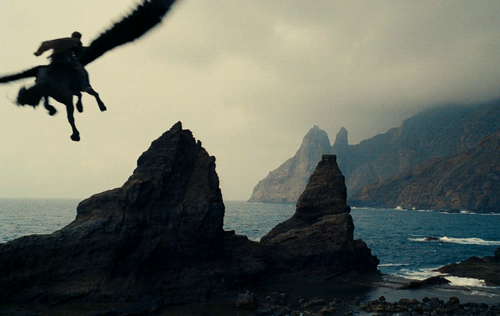
Other than the fact that this is based on Greek mythology (previously well-established as one of my favorite subjects), this movie is, in a way, responsible for my existence. And that is because, according to legend, this is the film that my parents went to on their first date. And apparently, it went very well, because I came into being 10 years afterwards. So, yeah, this film is personal, like Dirty Dancing.
And also like Dirty Dancing, I HAVEN’T SEEN IT? I don’t know HOW I escaped seeing this movie. And that’s especially considering that I’ve seen the new one. And that movie was...not great.
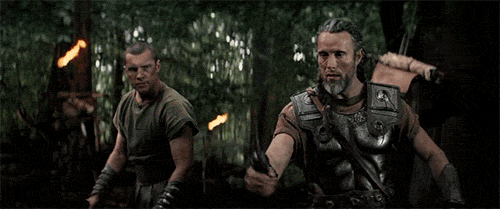
Maybe not the worst film I’ve ever seen, but it’s definitely not a good movie. But OK, what’s this one about, exactly? Y’all ready for “The 365 Greek Mythology Hour” again? OK, then, here we go. SING IT LADIES
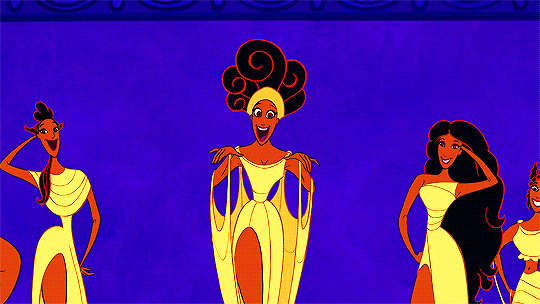
Clash of the Titans concerns the myth of Perseus, one of the greatest Greek heroes ever. Before Heracles, there was Perseus, son of Zeus. Yeah, Zeus, as he is wont to do, came down to Earth and had some good time with the princess of Argos, the beautiful Danaë. He came upon her while she was locked in a box by her dad, Acrisus, king of Argos.
Yeah, the Oracle at Delphi, ever the wisest, was visited by Acrisus one day, who wanted a son instead of a daughter. The Oracle spoke with Apollo (AKA huffed some of that SWEET SWEET ETHYLENE GAS), and told him that his daughter’s son would kill him. And so, he did the most logical thing: he locked her in a box. Yup. Dick. SPEAKING of dick, Zeus appeared to her in the open box as a golden shower. NOT THAT KIND OF GOLDEN SHOWER. I mean a literal shower of gold. Although...I wouldn’t put it past Zeus, of all gods. Dude was kinky.

So, Perseus is conceived, and Acrisus responds to this with his usual tact; he stuffs Danaë into a SMALLER box, and shoves it out to sea. She gives birth to a boy in the box, and the two eventually wash up on the shore of an island, where a fisherman finds them and takes them in. The boy is named Perseus.
Years go by, and Perseus’ mom is sought by his adoptive dad’s brother, and the king of the island, Polydectes. Polydectes is kind of a dick, and Perseus, now an adult man, doesn’t like him. The feeling’s mutual, and Polydectes has a plan. He holds a banquet, and forces all invited to bring a gift of horses. Perseus, being pretty poor, cannot bring this gift, but promises on his honor to bring whatever Polydectes wants of him, no matter what. And Polydectes asks for the head of Medusa.
Fuck.

Medusa’s one of your classic Greek monsters, a Gorgon. She’s one of Athena’s victims, formerly a vain temple priestess who was, well...raped by Poseidon, let’s be honest. However, since Athena’s priestesses were meant to be celibate, she was the one who ended up being punished. Fuckin’ YIKES. But OK, literal ancient gender politics aside, Athena cursed her with snakes for hair, and the ability to turn her victims into stone with a gaze into her eyes. Classic. And sure death for anyone who went after her.
So, Perseus is fucked. He’s gotta kill Medusa, and he doesn’t even have a way to get to her place. And that’s when he gets a favor from none other than Athena, goddess of wisdom and wartime strategy, as well as Perseus’ half-sister. I love Athena (other than the Medusa bullshit, obviously), and this is one of her most prominent roles in mythology. Well, that and the creation of spiders. That was also punishing a woman for her vanity, by the way. She has a type.
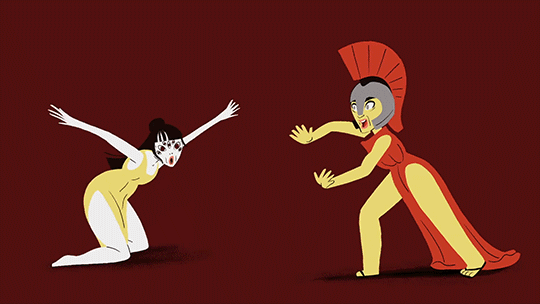
First, Perseus was told to find the Hesperides, nymphs of the dusk and dawn who would give him weapons. He got their location from the Greae, more colloquially known as the Gray Sisters. Weirdly enough, you may know them from Hercules, where they were combined with the Fates. They don’t have the future gimmick, but they do have that whole “sharing an eye” thing. Also, they share a tooth. Neat.
Anyway, Perseus takes their eye hostage, which makes them tell him where the Hesperides are. He goes to them, and they give him a bag to hold Meduga’s head. Then, the gods step in. Zeus decides to be a good dad for a change, and gives him an indestructible sword, and Hades’ Helmet of Invisibility. Hermes, another of Perseus’ half-brothers, gives him a pair of winged sandals to fly with. And Athena, technically Perseus’ patron, gives him a mirrored shield.
Perseus heads to the cave of Medusa, uses the shield, then goes up to her and cuts off her head. From her neck, for some goddamn reason, and golden sword pops out, alongside this guy.

Yeah, he’s not made out of clouds. He’s actually the, uh...he’s the result of Poseidon’s crime against Medusa. Fucked up, innit? Pegasus flies up to hang out with Bellerophon to kill the Chimera, and Perseus heads back to...actually, he goes to ANOTHER king who was a dick to him, and turns him into stone with Medusa’s head. Kings hate Perseus, seriously.
Perseus heads home after that, and goes through Ethiopia. There, he meets the King and Queen, Cepheus and Cassiopeia. Cassie’s gorgeous, but she tells Perseus that her daughter Andromeda is, like, WAY hotter, as beautiful as the sea goddesses. Which PISSES OFF POSEIDON (who is basically the villain of Perseus’ story, let’s be honest), and he send a sea monster named Cetus to destroy the kingdom, UNLESS they sacrifice Andromeda to it. And, because kings are assholes in this story, they do, chaining Andromeda to a rock. But, because Perseus believes that all women are queens, he goes to rescue her, and kills Cetus using all of his things. He weds Andromeda, and turns his romantic rival Phineus into stone using Medusa’s head.
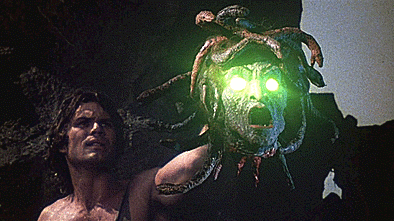
Usually, that’s where retellings end, because there’s a recurring trend to Perseus’ story after that. A king is an asshole, Perseus whips out the head, asshole becomes statue of an asshole. However, there is that prophecy to contend with, about Perseus killing his grandfather. See, Acrisus basically retired by this point, and lived in the kingdom of Thessaly. But one day, he went to see some games, in which Perseus was competing in the discus. Well, wouldn’t you know it, Perseus isn’t great at it, and loses control of the discus, which hits Acrisus, killing him instantly.
Utimate frisbee, man. It’s dangerous.
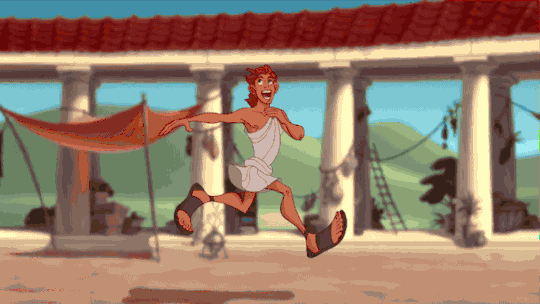
There’s another version where Perseus uses Medusa’s head to turn his dad into stone, surprise surfuckingprise there. But yeah, after that the story varies. Sometimes he becomes a king, sometimes he doesn’t. He basically always marries Andromeda and has kids with her. Sometimes he founds a city of his own, sometime he doesn’t. And in one ending, where he’s lived to be an old king, he fulfills his ultimate destiny and turns Medusa’s head on himself. Geez.
So, yeah, there you go. That’s the story of Perseus. Let’s, uh...let’s see what the movie does, huh? This is another Ray Harryhausen joint, so I’m...tentatively excited for it. We’ll see how badly they mess up the myth, and whether or not it works despite that. So, ENOUGH of me lecturing you guys, huh?
SPOILERS AHEAD!!!
Recap (1/2)
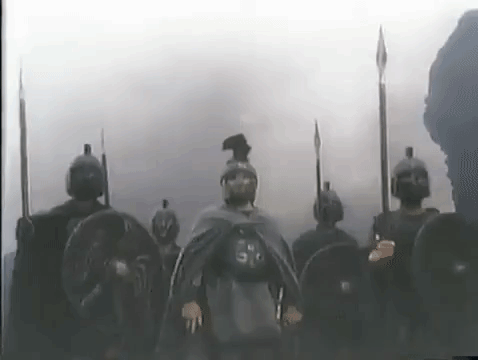
We begin approximately where most iterations do: King Acrisius (Donald Houston) has just cast his daughter Danae (Vida Taylor) and grandson Perseus into the ocean, containing them within a wooden chest in order to “forgive his daughter’s crimes”. Yeah, sure, OK, buddy. Whatever helps you sleep at night.
This also pisses off Zeus (Laurence Mother Fucking Olivier), who consorts with the rest of the Olympians on what to do to Acrisus. Said Olympians include Hera (Claire Bloom), goddess of marriage and women; Thetis (Maggie Mother Fucking Smith), goddess of the sea and leader of the Nereids; Athena (Susan Fleetwood), goddess of wisdom and strategic victory; Aphrodite (Ursula Andress), goddess of love; and Poseidon (Jack Gwillim), god of the sea.

Hera tries to defend Acrisus, noting his prior years of devotion to Zeus and the other gods. But Zeus ain’t HAVING that shit, and tells Poseidon to destroy the city of Argos in revenge. This is to be done by...releasing the last of the Titans? Which is apparently the Kraken. I mean...no, a thousand times no, but whatever.
This little tantrum is Zeus’ way of showing his love towards Danae, whose child Perseus is his. This is helpfully pointed out by Thetis, who seems...a little spiteful, as much as Hera is about Perseus. Seems like she’s stoking some fires. Hmm. She is Queen of the Nerieds, so she may play a larger role later on.
Beneath the sea, Poseidon readies himself to set loose the Kraken and destroy Argos, at Zeus’ command. Zeus, meanwhile, kills Acrisus by using a clay voodoo doll of sorts to strike him down. And that’s when Poseidon lets loose the Kraken for the first time. And the Kraken...
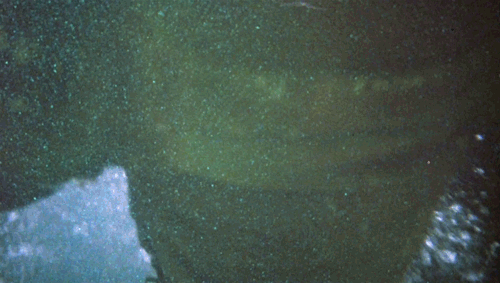
Guys, the Kraken looks...actually, I’ll spoil his appearance later on. The Kraken destroys the city, and Zeus kills Acrisius. So much for the goddamn prophecy that explains why Acrisius did what he did, but fuck me, I guess. Danae and Perseus, meanwhile, have safely arrived on the shores of the island of Seriphus, at Zeus’ insistence. There, Perseus grows from child into a fine young man, with Zeus always watching over him...and with Thetis and company always watching over Zeus. Interesting.
The adult Perseus (Harry Hamlin) lives happily on the island, much to Perseus’ delight. Thetis, on the other hand, asks about her mortal son, a young man named Calibos (Neil McCarthy). Apparently, Calibos is a bit of a monster, and while he’d been set to wed the princess Andromeda, he’s also managed to kil all living things on the island that he’s been given, save for a single winged horse named Pegasus. Hence...he is to be punished.

Calibos, by the way? Entirely original creation of the film, and there’s nobody like him in Greek mythology. Anyway, Thetis is crushed by this, and decides to exact revenge of both Perseus and her son’s would-be fiancee, Andromeda. She pledges to open up Perseus’ eyes to grim reality, and does so by placing him in the kingdom of Joppa, where Calibos was originally set to rule alongside Andromeda.
Here, in an amphitheatre, he encounters a mysterious masked and robed figure, who quickly reveals themselves to be Ammon (Burgess Meredith), a poet and playwright. Apparently, Ammon wears his disguise to scare off trespassers. He tells Perseus that all of Joppa is in a tizzy about a curse of some kind, and that the story of the fallen kingdom of Argos is a famous legend.

Ammon tells Perseus to go back home to Seriphus, but Perseus tells Ammon that he’s promised to restore his mother’s old kingdom, and decides that Joppa would be a good start. Despite his drive, though, Zeus is pissed off at Thetis for plopping Perseus down unprepared. He tells the other goddesses to give him gifts to help him claim the kingdom of Joppa as his own. This includes a helmet from Athena, a sword from Aphrodite, and a shield from Hera. I mean...OK, that’s super goddamn weird, but OK.
After Zeus leaves, the goddesses rightfully complain about Zeus’ constant womanizing, but note that he probably doesn’t remember Danae at this point, is is most likely acting out of stubborn pride for his “handsome son”. Their words, not mine.
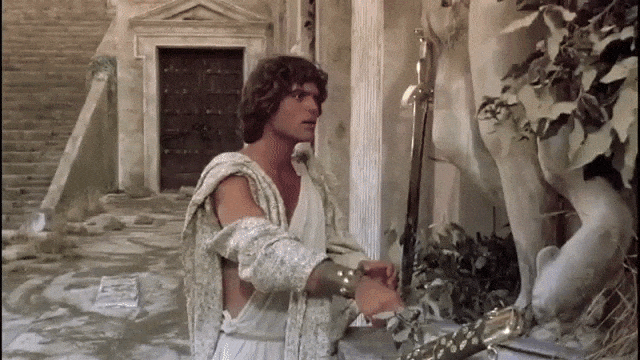
In Joppa, Perseus finds the gifts by the statues of their grantors. The sword from Aphrodite is adamantine, like the original myth, and slices through marble without a blemish. The shield from Hera...talks. Yeah. The shield bears the visage of Zeus, who tells him that the weapons are gifts from the gods, and that the helmet from Athena turns the wearer invisible. I mean, fuck Hades, I guess, but OK. Technically Athena did give the helmet to Perseus, so OK.
Armed with his new gear, an invisible Perseus immediately takes off to see Joppa, sans his sword. We only see his footsteps in the sand as he leaves, which is legitimately a VERY neat effect, and I’m not sure how they did it, but it’s neat as hell. Off to Joppa, a vaguely Phoenician/Persian kingdom, despite the fact that the original Joppa, or Jaffa, is a port city in Israel.
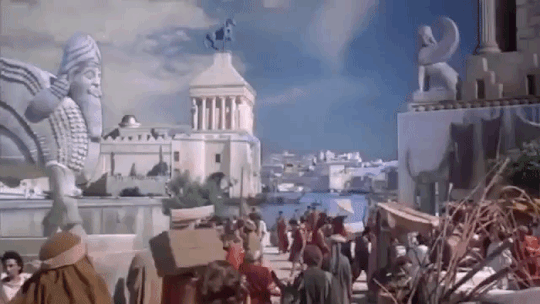
There, he meets a soldier, Thallo (Tim Pigott-Smith), who tells him of the situation. Since Calibos fell to Zeus’ wrath, Andromeda rejected him, allowing any suitor to try for her hand, whether they be royal or not. To do so, they must answer a riddle. If they fail to answer, the would-be suitor is burned to death. This is lorded over by Queen Cassiopeia (Sian Phillips), while Andromeda (Judi Bowker) lives in the tower of the palace.
Which is why Perseus IMEDIATELY uses the helmet to go into her room that night! CLASSY, PERSEUS. There, he sees...a giant vulture bring a cage to Andromeda’s balcony. No idea where in the fuck this is going, but that’s a damn good looking vulture. God, I love Harryhausen.

Anyway, the vulture is here for Andromeda’s soul, which leaves her body and goes to sit in the cage. The vulture takes off with it, al as the invisible Perseus watches on. He takes this opportunity to touch Andromeda’s face in her sleep (stop, Perseus, for the love of Zeus), then decides that winning Andromeda is his destiny. And so, his simpin’ journey begins.
The next day, Perseus asks Ammon how they can follow the vulture, who has apparently headed to the marshes to the “marsh lord”. To follow the vulture, Ammon suggests that they find and capture the last of the winged horses, known as Pegasus. And we’ve officially lost the track of Greek mythology at this point. Shit.

Well, with Ammon’s help, Perseus captures Pegasus and rides him through the skies. Meanwhile, in Corinth, some dude named Bellerophon is just having a stroke, I guess, because he’s totally fucked now. Whatever. The next day, the vulture comes back to Andromeda’s place and takes her soul to the marsh. But this time, Perseus and Pegasus follow them.
In the marsh, the marsh-lord and riddle-maker is revealed as Calibos, who is still in love with the beautiful Andromeda. As she cannot love him, he provides to her another riddle to give her would-be suitors. In tears, she memorizes the riddle and its answer, Calibos touches her uncomfortably, even as Andromeda asks him to lift his curse and show pity. But he refuses, in pain from his love. Jesus, this movie should be called Clash of the Simps, goddamn.
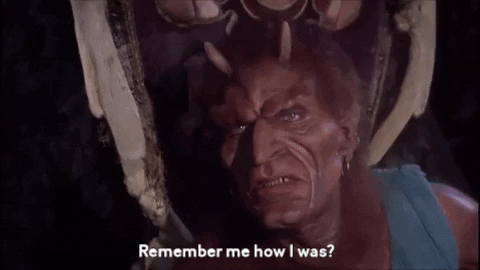
Perseus was watching the whole thing, though, which Calibos immediately figures out when he sees Perseus’ footsteps in the dirt. As Perseus goes through the swamp looking for Pegasus, he’s found and attacked by Calibos. Calibos, by the way, is a guy in pretty solid makeup in close-up shots, and a Harryhausen model in far-away shots.

The two struggle, the helmet is lost in the swamp, and Perseus draws his sword. But we suddenly cut away to see the daily ritual of the presentation for Andromeda’s would-be suitors. Perseus steps in, having survived the attack from last night, and offers his hand to Andromeda, who recognizes Perseus from a dream. She gives the riddle, which is ABSOLUTE BULLSHIT. Here, I’ll prove it.
In my mind’s eye, I see three circles joined in priceless harmony. Two, full as the moon; one, hollow as a crown. Two from the sea, five fathoms down. One from the Earth, deep under the ground. What is it?
Any guesses? Anybody?

NO MATTER WHAT YOU FAIL. Because the answer is Calibos’ ring! HOW IN THE SHIT WOULD ANYBODY HAVE GUESSED THAT? It’s a golden ring with two pearls on it! WHO KNOWS THAT SHIT? I call complete bullshit, and the only reason that Perseus knows it is because he spied on this last night! Also, because he cut off Calibos’ hand, and made him renounce his curse, which is...never really specified, now that I think about it.
With that, Perseus has both Andromeda’s and Calibos’ hands! HA! Calibos is not as amused, as he preys to his other Thetis, at a temple of hers. He demands that Thetis take revenge on those whom Perseus loves, specifically Andromeda and the city of Joppa itself. He demands justice, but Thetis identifies this correctly as revenge. All the while, Perseus declares his love for Andromeda, and they seal their union with a kiss and ritual.
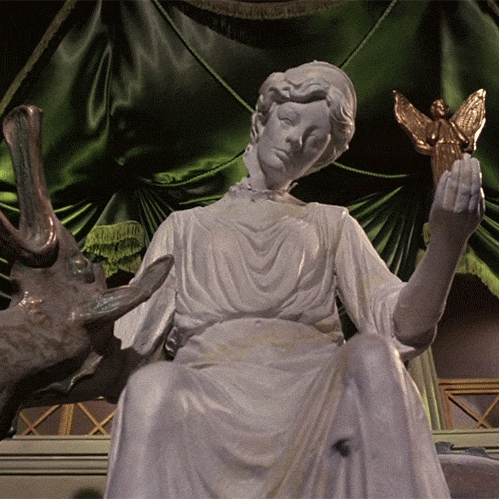
During this ritual, in which Andromeda and Perseus are essentially married, Queen Cassiopeia, LIKE A DUMBASS, says that Andromeda is more beautiful than the goddess Thetis herself. Yeah. BAD FUCKING MOVE, especially because she said that IN FRONT OF THETIS’ FUCKING SANCTUARY. At least that dumbass move was kept from the original story.
Well, Thetis tells Cassie that she can only atone for her stupidity in one way: sacrifice your daughter to the Kraken in 30 days. Later on, Perseus speaks with Ammon to figure out how they can defeat the Kraken. Ammon suggests speaking with the “Stygian Witches”, who I’m assuming are our Grey Sisters for the night. However, according to Thallo, they have a taste for human flesh. Still, Perseus is going, as are Ammon, Thallo, and Andromeda. But not Pegasus.
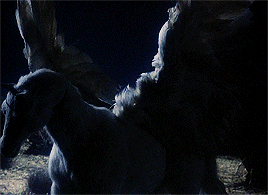
Well...shit, man. That changes a few things, huh? But that’ll be addressed...IN PART TWO! See you there!
#clash of the titans#clash of the titans 1981#desmond davis#greek mythology#perseus#harry hamlin#andromeda#judi bowker#burgess meredith#maggie smith#laurence olivier#ray harryhausen#fantasy march#user365#365 movie challenge#365 movies 365 days#365 Days 365 Movies#365 movies a year#mygifs#my gifs#merlinsprat
13 notes
·
View notes
Text
I'm surprised this is a discussion, it seems so straight-forward.
“Even if Perseus only killed Medusa to save Danaë he still values the life of one woman over another” fucking yes??? That’s his mom??? And Medusa is not only a monster but a stranger??? Danaë sacrificed so much and been through hell and if Perseus wasn’t willing to conquer the world for her there’d be something wrong with him.
#greek mythology#ancient greek mythology#greek pantheon#perseus#Danae#Danaë#Perseus and Medusa#Medusa#Gorgon#Gorgons#Greek monsters#<- prev tags#musesdaughter speaks
515 notes
·
View notes
Text
Jenny Saville at Gagosian 980 Madison Avenue, New York
October 28, 2020

JENNY SAVILLE Elpis November 12–December 22, 2020 980 Madison Avenue, New York __________ The art I like concentrates on the body. . . . It’s more than representation; it’s about the meaning of existence and pushing the medium of paint. —Jenny Saville Gagosian is pleased to present Elpis, an exhibition of new paintings by Jenny Saville. This exhibition marks the reopening of the gallery at 980 Madison Avenue following the pandemic-related shutdown in March. Saville’s monumental portraits explore the artist’s persistent fascination with the human body and its aesthetic potential through bold and sensuous use of surface, line, and mass. Titled after the ancient Greek personification of hope left behind at the bottom of Pandora’s box—a spirit traditionally associated with the burdens of human suffering—the paintings in Elpis are grounded in tangible realities while reaching toward their mythological dimensions. Though resolutely of its time, Saville’s art speaks to a profound reckoning with the primordial lineage of humanity. The ancient world comprises one of her most enduring sources of inspiration. In the past, she has presented the human figure as classical sculpture, melding marble and flesh through a complex layering of body parts and transhistorical artistic tributes. In the massive canvases presented at her 2014 solo exhibition Oxyrhynchus at Gagosian Britannia Street, London, Saville intertwined palimpsestic silhouettes and fleshly forms, alluding to the trove of documents and literature that lay dormant in the famed titular Egyptian archeological site for millennia.
Saville’s painting is steeped in a multitude of times and places; she illuminates some of the works in Elpis with gold oil bar to produce a shimmer recalling Byzantine icons and mosaics, whose metallic adornments were designed to take on a spellbinding and spiritually transcendent glow when lit by flickering candlelight. Her use of gold also invokes the precious metal’s association with divine embodiment, a tradition dating back to the ancient Egyptians, who imagined gold to be the “flesh of the gods,” and to the Greek myth of Danaë, who was impregnated by Zeus in a shower of golden rain.
Saville’s references and techniques span Western art history—combining the striking chiaroscuro of Baroque portraiture with the dappled light of Impressionist plein air painting—and also encompass snapshots from everyday life, such as the angular, translucent shadow of a windowpane or the light of a computer screen illuminating one’s face in the dark. The raw chromatic vitality of Saville’s new works was largely inspired by her recent travels to Australia, where she encountered the luminous, fleshy palette of Emily Kame Kngwarreye’s virtuoso paintings. For the fiery-toned pastel painting Prism (2020), Saville combines her tribute to the Indigenous Australian artist with another: she created this work using a set of crayons purchased from Henri Roché’s La Maison du Pastel, a famous art supply store in Paris once frequented by Edgar Degas.
Saville paints from photographs of models, often singling out and magnifying individual body parts that capture her attention: the vulnerable intensity of a wide-eyed stare, or the provocative glimmer of lips and pale teeth. In the self-portrait Virtual (2020), featured earlier this year in the first season of Gagosian’s Artist Spotlight series, Saville compartmentalizes her facial features into disorienting boxes that recall windows jostling for space on a computer screen, or the stream of talking heads that populate news broadcasts and online webinars. At the brink between realism and abstraction, Virtual recalls fragmented portrait heads by Pablo Picasso and Francis Bacon as much as it points to the increasing slippage between the physical and the virtual in today’s image-saturated world. _____ Jenny Saville, Prism, 2020, pastel and charcoal on canvas, 78 3/4 × 63 inches (200 × 160 cm) © Jenny Saville. Photo: Prudence Cuming Associates
17 notes
·
View notes
Text
Klein goes on to describe a landscape as impressive as the wild sea where Danaë is stranded:
Es hat sich die Erde gefaltet hier oben, hat sich gefaltet einmal und zweimal und dreimal, und hat sich aufgetan in der Mitte, und in der Mitte steht ein Wasser, und das Wasser ist grün, und das Grüne ist weiß, und das Weiße kommt von noch weiter oben, kommt von den Gletschern...
[Up here the earth has folded over, it’s folded once and twice and three times, and opened up in the middle, and in the middle there’s some water, and the water is green, and the green is white, and the white comes from up further, comes from the glaciers...]
Celan tells us this landscape is both visible and invisible to Klein. For although Klein “has eyes,” he is separated by “a movable veil” from what is going on in nature, so that everything he sees is “half image and half veil” (halb Bild und halb Schleier). Behind the veil, behind the folded-over surfaces of glaciers, behind the closed eyes of sleepers, lies something Klein cannot see or speak to. Klein feels his separation from the world behind the veil mainly as an incapacity of language:”
Das ist die Sprache, die hier gilt, das Grüne mit dem Weißen drin, eine Sprache, nicht für dich und nicht für mich—denn, frag ich, für wen ist sie denn gedacht, die Erde, nicht für dich, sag ich, ist sie gedacht, und nicht für mich—eine Sprache, je nun, ohne Ich und ohne Du, lauter Er, lauter Es, verstehst du, lauter Sie, und nichts als das.
[That’s the kind of speech that counts here, the green with the white in it, a language not for you and not for me—because I’m asking, who is it meant for then, the earth, it’s not meant for you, I’m saying, and not for me—well then, a language with no I and no Thou, pure He, pure It, you see, pure She and nothing but that.]
Language is at issue because conversation, even amid the brutal snags to conversation that both Klein and Danaë experience, is the event that Celan and Simonides want to stage. Why has Klein come up into the mountains? “Because I had to talk, to myself or to you.” What does Danaë beg of her sleeping child? “That you lend your small ear to what I am saying” (19–20). Neither of them finds their way to a satisfactory conversation but both insist on standing in the gap where it should take place, pointing to the lacunae where it burned. No more than Danaë is Klein able to find “speech that counts here.” He cannot talk the language of glaciers, as she cannot speak to sleep or sea. Yet in the absence of a “language with no I and no Thou,” Klein does manage to exchange some “babble” (Geschwätz) with his kinsman Gross. What kind of language is this?
— Anne Carson, Economy of the Unlost: (Reading Simonides of Keos with Paul Celan)
#m#Paul Celan#Anne Carson#Economy of the Unlost#Economy of the Unlost: (Reading Simonides of Keos with Paul Celan)#Simonides of Keos#nonfiction#Danaë#Lenz#Gespräch im Gebirg
1 note
·
View note
Text
Thoughts, not even a review, of Terra Ignota
recently finished Will to Battle.
(Book 3 of Terra Ignota, preceded by Too Like the Lightning and Seven Surrenders. The sequel and finale, Perhaps the Stars, is expected in 2021.)
So I wanted to post some thoughts, not even a review, really.
The take away is that despite many of its major, fundamental features leaving me cold or even actively repulsing me, I overall very much enjoyed reading it.
This is perhaps a higher recommendation than unalloyed praise. The more I like something, the more I complain. For one thing, it's a kind of eustress: the perfect thing has no flaws to catch interest; for another, if I just plain dislike something, I wouldn't spare much thought on it to begin with, much less linearize so many of them into words.
So my mostly negative venting (consisting of immediate and thorough spoilers) beneath the cut
So right off the bat: I HATE the genius serial killer trope; and I detest SFF trolley problem analogs.
I was so irritated by the one-two punch of these big reveals in the first book that I actually let my hold on Seven Surrenders and read several other books in the interim. (I knew I'd be back though, I put a new one on both 2 and 3 next.)
Mycroft Canner... one who believes themself "free" merely because they can kill. It reminds me of something that's stuck in my mind for a long time: a guy calling other peoples cucks because they used alarm clocks to wake up. "I can't believe you let a machine boss you around."
Because I otherwise liked the writing so much, I kept trying to dredge up another layer of meaning to the treatment of Mycroft as torturer-rapist-murderer. For instance: "Oh, so many people around him being sympathetic and liking him is actually the narrative sneakily reminding us that the core trait of serial killers like this is a manipulative personality, which his savant abilities would only feed." Carlyle Foster even brings this up specifically in the scene where we first learn the specifics of Canner's crimes, but of course, their portrayal in that scene (which, reminder, is literally by Mycroft) is of one hysterical and unreasonable.
Palmer did achieve one of most author's highest goals in emotionally transporting me to one of their scenes, but it just really made me wish I was in Carlyle's shoes. To react with, rather than panic, the cold disdain merited by a creature so broken it is wrong about the ways in which it is broken. To spit on them and denigrate their feelings of uniqueness and specialness, arising both from the murders and from their oh so pitiable martyrdom and servitude now. "If only we could mercifully lobotomize away your personality and still use the savanthood modules so unfortunately stapled to them."
Mycroft: "Everybody seems to have one murder they thought was the worst. I thought yours would be []" Me instead of Carlyle, snidely: "Is that a fun game for you, that speculation?"
(In another scene, the Major's sympathy to Mycroft and Saladin as "fellow killers" somewhat raised my hackles; my experience is military people expressing exaggerated disgust for "civilian" killers, perhaps as a way of mental separation between their acts. Though the revelation that the Major is Achilles, with an ancient's attitudes, perhaps ameliorates this.)
As for OS... if you've invented prophecy, there will be heaps upon myriads upon multitudes of miraculous ways to reshape the world before you reach a best value intervention of cold-blooded murder. I was, at least, amused by considering the linear combination of this limitation between the author and the characters. Palmer was quite clever in making sure that the mystical demographic math must be facilitated by humans (and the very odd set-set humans at that).
I admit I hold this philosophy a bit more strongly than my time investment in the fields merit, but I see it this way:
In physics, infinite, friction-less planes in perfect vacuums occupied by inelastic, spherical cows are a useful tool. They approximate things that are theoretically possible, absent the various extra forces.
In ethics, and in any system that is so truly complex, everything you remove makes for a completely different system. None of the elements are basically orthogonal to the circumstances the way air resistance is to a bullet.
These philosophical sorts of thought experiments are, at best, emotional exercises. They are not simplified tools to build a foundation for more complex issues, they're figments born of the phantasmal conditions possible only in the interior of the brain, and too much work with them will only foul both logic and intuition with garbage data.
As for what merely fell flat:
While I deeply enjoyed so much of the speculation about cultural changes brought about by technology, and travel technology specifically, the "no proselytizing" law felt quite forced. I can definitely believe such a law would be passed after the Church Wars described, but holding so strong for centuries?
There are all kinds of supernatural thoughts and beliefs people accept, and there simply isn't a neat threshold between those and religion. Even in the counterfactual world where there was one, it would be quite concealed by the sophistry that's metastasized through the entire discussion space around it.
I can think of a dozen questions off the top of my head that they'd have to decide. And while flipping a coin or an attempt at a definitional framework could answer them, it couldn't do it in a way that's strong enough to stand the test of time. Imagine Laurel/Yanny, the Dress, or if a hot dog is a sandwich, but with material-security level of investment in them!
I'm areligious (to put it... mildly) but for personal, psychosocial reasons, when I sit down to eat I spend a moment in mindful gratitude towards the plants and animals that gave their life for mine. Is that religious? Are ghost hunter shows illegal because they're proselytory for any animistic religion? Would acupuncturists be able to work, or is that a daoist superstition? Could my neighbor's still paint the ceiling of their porch haint blue? Are scientists allowed to register trials for psychic powers? Can schools teach the arguments for dualism?
That doesn't even get into the subjects that, in real life, yank out all the stops on linguistic-conceptual inventiveness! Europe has had a pestilential outbreak of sophistry around head scarves! Would the Alliance ban them for being religious garb? If so, would they ban clothing that covers the ankles as Calvinist religious garb? Or that covers the nipples? (Oh wait, showing the nipples is of significance in some religions! can't allow that!) Should they ban clothing that contains unmixed fibers for being a religious display!? They don't seem to do any of these things, but that's just as much a choice about the First Law as doing so.
Someone proposes personhood begins at conception; I claim that this is fundamentally a supernaturalist belief. Is one of us in violation of the first law? If a hive outlaws birth control, how are they investigated for whether this is a cultural or religious condition? What happens when, I dunno, a Cousin run campus has somebody that wants to put Intelligent Design in the biology textbooks? Most people (well including the people pushing it) know that it's religion wrapped in plausibly deniable words. So is that proselytizing, or is someone pointing it out proselytizing atheism?
Speaking of, there's a pretty good correlation of peace and prosperity with movement to non-religioun. It honestly doesn't seem like sensayers should have much work.
But we meet Bridger and his miracles right at the beginning of the book, before we know a thing about the Church Wars etc. And it's obviously a central tension of the story, intended to be coequal with the brewing war, and yet it quite failed to rouse my interest. The book would've been stronger without it.
Perhaps this *is* just a me thing, since my mind has held miraculous intervention as a solved problem for most of my life. If I were convinced of an event's miraculous character, the most parsimonious explanation is in the vein of, "We're in a simulation that's only been running for a week or so, either as a game or as an experiment, and now we're running under different rules than the ones our (artificial) memories imply." The probability of that happening is too low to waste time processing any other ramifications or possibilities ahead of time.
There is another, related layer of enjoyable consideration, which is of course the reliability of the narrator and his evidence. In Will to Battle, our author is revealed as explicitly delusional, suffering regular, presumably PTSD (and/or anti-sleep drug) related hallucinations. I wish I'd had the patience to do a very close read, or to do a second read—especially given the revelation that 9A edited some of the delusions out of the first two books. Diegetic skepticism is a regular part of the narrative. And there are lots of "rhymes" in the text to mundane circumstances. We're told Bridger looks like Apollo and Seine, and shown the artificial, parentless children, Ganymede and Danaë (crafted to be such a degree of hyperstimulus that among other things, Ganymede has an entire school of art dedicated to him). We're shown that perceptions are malleable, with Thisbe's "witchcraft" and Cato's magician like showmanship. We're constantly exposed to griffincloth and know that just its presence at JEDD's assassination spread skepticism. We're told that scientists proclaim Achilles to have Ancient Greek DNA and an adult's bone structure, but we're also constantly shown an incredible variety of artificial animals and related wonders, and told Apollo was a great scientist.
And yet, over and over the narrative rebukes skepticism. 9A endorses most of what Mycroft has written, and if we go so far as considering them (along with, eg, the officialese headings and warnings) as Mycroft's delusions too, we're at the point where we have to step back so far that the unreliable narrator is actually this "Ada Palmer" character, who is writing about things that don't exist in a year we haven't reached yet!
I was bothered that nobody who learned about it seemed ready to express the proper amount of disgust at the extra-incestuous politics of the world leaders, and honestly find it simply hard to accept that their consortium worked so altruistically.
Finally, ultimately, the central themes of the novel, about peace and war and complacency seem awfully poorly considered for the current era, where voting age children have never known a world without an official war, and the just grown generation is the first since the industrial revolution to be poorer and less healthy and more stressed than their parents. Not just this novel, but the world in general seems to be sorely missing the concept of the important qualitative differences between distress and eustress.
4 notes
·
View notes